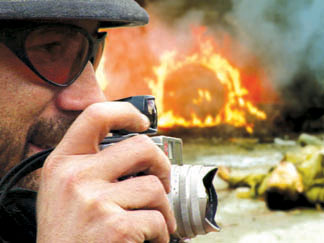Though war photographers have often been captured on screen, no film has followed their career trajectories as closely as BLOOD TRAIL. Director Richard Parry has been intermittently checking in with photographer Robert King, from his start in Bosnia to his career boost in Chechnya to his struggles embedding in Iraq. His portrayal of King~s personal and professional growth is reminiscent of Michael Apted~s Up series “~ only under fire.
When we first meet King as a naive twenty-four-year-old covering Bosnia in 1993, his prospects do not look promising. You would not bet that he would live to see thirty or even twenty-five. He is full of aspirations to win a Pulitzer, but has a lot to learn about how to take a picture, how to sell a picture and how to avoid snipers. King~s southern upbringing in Tennessee sets him apart from the other members of the press corps, who tended to congregate in media capitals like London or Manhattan. We see him develop a camaraderie with Vaughan Smith, a more seasoned British journalist who teases the newcomer over his lack of knowledge.
Blood Trail dispels the romance and sanctimony that often clings to depictions of war journalism. “Why would you risk your life to take pictures that no one wants to see?” asks a woman in the film. War photographers are driven to bear witness, but other motivations are part of the mix “~ like overcoming personal demons or seeking a perverse form of glory “~ that BLOOD TRAIL candidly explores.
King has still not achieved his Pulitzer, but he has earned the respect of his peers, and we see them sharing war stories in London~s Frontline Club (which was founded by Smith). As a freelancer, King lacks some of the notoriety that comes with photo agencies like Magnum or VII, but this makes him even more representative of those in the press corps who risk their lives to bring us the news. While visiting some of the most dangerous places on earth, BLOOD TRAIL also poignantly observes what it means to be rescued.
– Thom Powers, Toronto International Film Festival






